ISCAST–NZCIS Conversations 2025, in collaboration with the Centre for Theology and Psychology.
These sessions will be recorded, and registered participants will have access to the recordings as they are uploaded.
Thursday 20th Mar 2025 @ 6:30 pm –
Thursday 29th May 2025 @ 12:00 am
Online (Zoom)
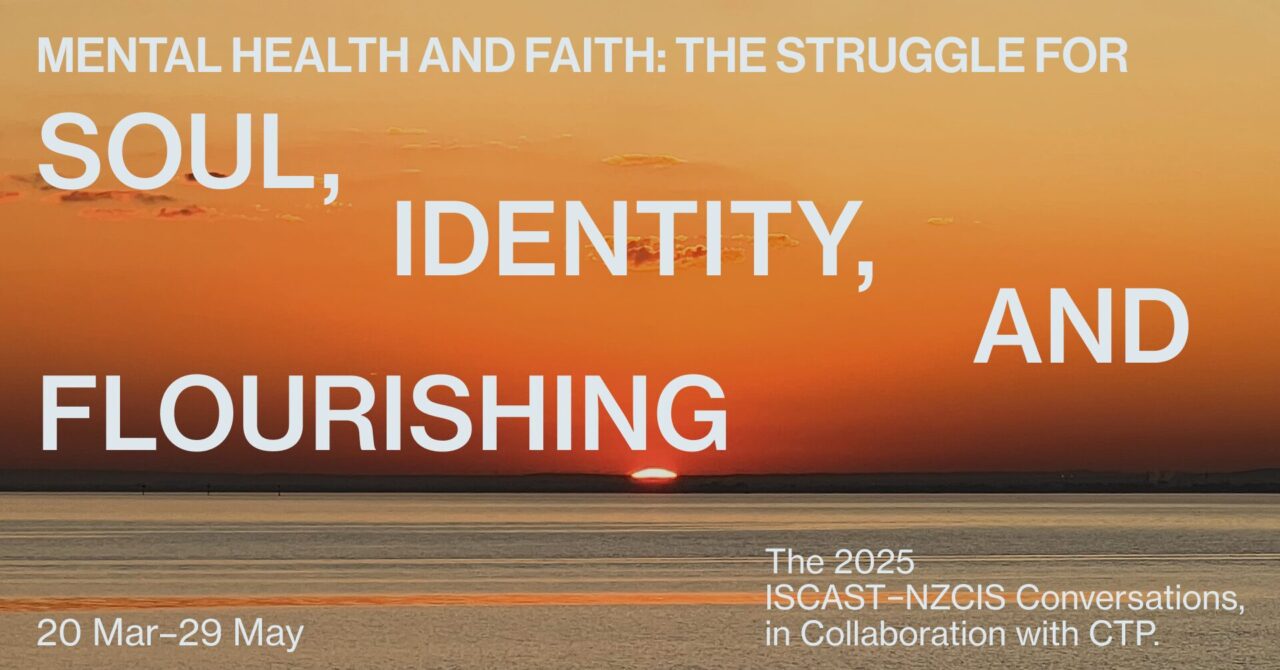
This series of online conversations delves into the growing mental health crisis, where mental illness is often a private battle that affects the deepest parts of the self and compromises one’s sense of identity. Compounded by shame, stigma, and the difficulty of accessing meaningful help, mental health challenges continue to rise.
With mental illness projected to become the largest global healthcare burden by 2030, how might Christians think and respond, both clinically and theologically? Despite advances in science and technology, why are true cures elusive? Are we asking the wrong questions? Is the modern environment—characterised by technology, isolation, abstract thinking, and alienation from nature—contributing to this hidden suffering?
Furthermore, what does Christian faith have to offer those struggling with mental illness? Can we redefine wellness and well-being to encompass both the “long dark night of the soul” and the pursuit of joy and flourishing?
Join ISCAST and NZCIS, this time in collaboration with the Centre for Theology and Psychology at Melbourne School of Theology, for a 10-week series exploring Christian perspectives on some of the greatest mental health challenges of our time.
DETAILS:
- Thursday nights from 20 March until 22 May, with a break for Easter week (Thursday 17 April)
- Starts 6:30 p.m. AEDT or 8:30 p.m. NZDT (AEST/NZST from session 4 onwards)
- Presentation: 30 minutes
- Discussion & Questions: 30 minutes
THE SESSIONS WILL COVER:
- Drug addiction
- Eating disorders
- Gender dysphoria
- Christian contemplation
- Mental health issues in children
- Memory and the role of forgetting in mental disorders
- Fostering agency within the church
- Human flourishing
- The growing mental health crisis
- Developmental psychology and wellbeing
PRICES:
For this Conversations series, you can either register for the full series, or register for separate sessions.
We’re offering ISCAST and NZCIS members 50% off. If you’re a student member, you can register for free! Become a member of ISCAST or NZCIS today.
-
- $70 for the full series ($35 for ISCAST/NZCIS Members)
- $20 for student/concession, full series (FREE for student/concession members of ISCAST or NZCIS)
- $15 per session upon special request ($7.50 for ISCAST/NZCIS members)
About the ISCAST–NZCIS Conversations
Since 2020, ISCAST and New Zealand Christians in Science have run the Conversations series, with an aim to promote a dialogue between the sciences and the Christian faith. Experts are invited to speak on their topic, which is then followed by a Q&A and discussion.
“The result of the Conversations for me is that theology and science together now truly inform my worship—no doubts, no niggles, no uncertainty.”
“New subjects and old ones, presented brilliantly.”
Please Note
ISCAST’s aim is to generate a constructive conversation and, while ISCAST and NZCIS are committed to orthodox Christian faith and mainstream science, the Conversations speakers may come from a range of positions and do not represent either ISCAST or NZCIS.
Speakers & Topics
20 March | Dr Alan Gijsbers
What are the Sciences and Spiritualties of Clinical Practice?
We can no longer speak of the one science and one spirituality in clinical practice. We see snippets of a greater reality beyond us, and we see aspects of this reality through multiple lenses. Clinical practice itself is based on a multiplicity of different sciences including, but not limited to, neuroscience, psychology, sociology, epidemiology, nosology, and public health. Beyond the sciences we have philosophical, ethical, and aesthetic dimensions lurking behind our scientific perceptions.
Central to clinical practice is the individual patient’s history and its analysis. This calls for hermeneutics, for we hear about what is happening through the lens of the patient’s beliefs about what is happening and the therapist’s perception of the patient’s beliefs.
We interpret addiction through two key questions: what is the taking of addictive substances and why are addictive substances taken. For the first, I will look at Thorley’s domains of substance use and for the second, I will look at a number of models of addictive behaviour. Spirituality is an important dimension of recovery, and we will explore a number of ways these dimensions can be used in clinical care.
Speaker Bio:
Associate Professor Alan Gijsbers (MBBS FRACP FAChAM DTM&H PGDipEpi) is a Specialist Physician in Addiction Medicine and was the former President ISCAST. He was the former Head of the Addiction Medicine Service Royal Melbourne Hospital and former Director Substance Withdrawal Unit at the Melbourne Clinic in Richmond. He is a current Board member and chair of the governance committee of the International Christian Medical and Dental Association.
27 March | Dr Hayley Thomas
Delving Under the Surface: Eating Disorders and Christian Spirituality
Eating disorders are serious conditions that have a profound whole-person impact, and that are increasing in prevalence. The physical, nutritional and behavioural ramifications of these conditions warrant careful attention, yet could be considered the ‘tip of the iceberg’. Deep struggles with issues such as identity, shame, and suffering often lie under the surface. It is therefore perhaps unsurprising that religion and spirituality seem relevant to some people’s eating disorder journeys. Nonetheless, religious and spiritual aspects are rarely considered in care.
We are undertaking a study to better understand experiences of Christian spirituality in eating disorders from the perspective of people with lived experience of eating disorders, carers, healthcare providers and pastoral carers. We plan to use these insights to co-create a resource to incorporate Christian spiritual aspects in eating disorder care when this is relevant, desired and likely to enhance care.
This presentation will briefly outline the rationale for our study and preliminary findings, with opportunity for audience discussion and input.
Speaker Bio:
Dr Hayley Thomas is a clinical senior lecturer and senior research fellow with the General Practice Clinical Unit. She is a fellow of the Royal Australian College of General Practitioners and works clinically as a general practitioner (GP). Her previous research has focused upon whole person approaches to care and the GP-patient relationship. Dr Thomas is currently leading a project exploring the experience of Christian spirituality in eating disorders, supported by a grant from The John Templeton Foundation.
3 April | Dr Danny Cheah
Understanding Mental Health Issues in Children, Young People, and Families from a Christian Perspective #dontjustprayitaway
Mental health issues, like physical health issues and all forms of human suffering, occur as a result of the fallen nature of the world we live in. This talk is geared at reducing fear and stigma amongst Christians, through offering understanding of mental health issues, as well as integrating faith and clinical perspectives with a focus on children, young people and families.
Speaker Bio:
Dr Danny Cheah is a child and adolescent psychiatrist leading a service with 140 staff, providing multidisciplinary mental health care for people aged 0-25 in metropolitan Melbourne. Danny delivers training at churches across denominations and countries, to help Christians understand mental health issues, integrating clinical and faith perspectives.
10 April | Dr Brett Mann
Mental Health, Faith, and Medical Practice—A Sociocultural Perspective
In this talk Brett will discuss how the growing mental health crisis presents in general practice. He believes Christian perspectives provide deep insights into the sociocultural aetiologies of western society’s complex mental health challenges, and indicate ways to alleviate it in addition to the usual more narrowly focussed approaches of counselling and medication.
Speaker Bio: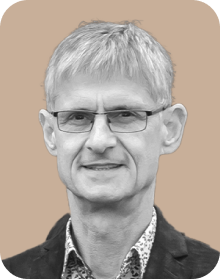
Dr Brett Mann recently finished general practice after 39 yrs at Ilam Medical Centre in Christchurch. He has been a medical educator for seventeen years in the RNZCGP registrar training programme and is a visiting lecturer at Otago Medical School. Dr Mann has informal psychotherapy training and has provided over one thousand hours of one hour counselling sessions in his practice with supervision. He has provided over nine hundred hours of group supervision, focussing primarily on the doctor-patient relationship.
Dr Mann had a central role in redesigning the RNZCGP national communication skills training programme and has provided many seminars around New Zealand for medical educators, general practitioners and registrars on somatisation (the expression of psychological distress through physical symptoms) and on advanced communication skills.
He has a high view of Scripture and a Christocentric, holistic perspective of the human person in community. In his medical career, Dr Mann has pursued an integrated view of the human person including mind, body, culture, nature and spirit, worked out in relationship-centred care. Theologically, he has been endeavouring to integrate Evangelical, Charismatic, Catholic and Orthodox theologies.
24 April | Dr Mel Fung
Understanding and Responding to Gender Dysphoria: Research and Clinical Experience
In recent years the condition of Gender Dysphoria has rapidly increased in our society, particularly among young people. Gender Dysphoria is the experience of mismatch between someone’s biological sex and the subjective, psychological sense of their gender. Someone who was born a biological male may have a deep sense they are actually female. This can cause distress and confusion and someone with this condition may seek psychological help. This presentation will be a deeper look at this condition and how we as Christians can understand it and respond to it—whether it is something you personally experience or someone you know does. Dr Fung will share about her research into this area and also her clinical experience of people with this condition.
Speaker Bio:
Dr Mel Fung has worked for over 20 years as a psychologist with 15 years in private practice as a Christian psychologist. She has a special interest in body issues and completed her doctoral thesis in body image, parenting style and self-esteem. Dr Fung recently finished her Master of Theological Studies at SMBC where she conducted research into Christians with Gender Incongruence / Dysphoria and their experience of church. She is passionate about churches engaging with the topic of gender and supporting those with gender identity struggles. This year she attended the Genspect conference in Portugal and wished there was a Christian voice to contribute Jesus’ wisdom to the conversation.
1 May | Dr Christa McKirland
Authority and Power Structures in the Church Which Undermine Individual Agency
The psychological need for agency is well-established in major theories of motivation (such as Self-Determination Theory). However, when it comes to our experiences in churches, agency is easily undermined through authority structures that enable overreach by those with power. In this talk, Dr McKirland will discuss some of my findings from a quantitative survey of NZ Baptists as it relates to authority, power, and agency. She will highlight both the challenges to fostering agency as well as some possible ways forward.
Speaker Bio: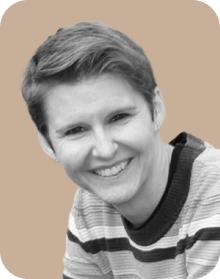
Christa L. McKirland (PhD, University of St. Andrews) is Dean of Faculty and a Lecturer in systematic theology at Carey Baptist College in Auckland, New Zealand. She is the founder and executive director of Logia International.
She has always loved asking questions, and research often revolves around inquiries such as, “What does it mean to be human? How does Jesus inform our understanding of humanness? What is the role of the Spirit in our maturity as the family of God? What understandings of power and authority facilitate our intended flourishing? How do we foster agency-supportive church structures for the benefit of all?”
These questions arise from her understanding of God as one who desires a flourishing creation and calls humanity to participate in sharing power toward this end.
8 May | Nicolette Deva
The Science and Faith of Christian Contemplation
Scripture emphasises the importance of stillness in spiritual formation. In Luke 10, Jesus affirms Mary’s posture of quiet attentiveness, declaring it as the “one thing that is necessary.” Over the past decade, there has been extensive scientific research into mindfulness and meditation, demonstrating their measurable benefits, including reductions in stress, symptoms of anxiety and depression, as well as improvements in cognitive function and emotional regulation. Functional MRI scans have further validated these findings, revealing neurological changes in long term practitioners, that support the restorative effects of stillness.
While mindfulness and meditation are found in various spiritual traditions, Christian contemplation is a distinct meditation practice with a history dating back to the early church, to at least as early as the 3rd century. Christian contemplative practices, such as Centering Prayer and Lectio Divina, offer not only the empirically supported psychological benefits of meditation, but also a deeper connection with God. In this talk, Nicolette will explore the biblical foundation of stillness in Scripture, examine contemporary scientific findings on its benefits, and highlight Christian contemplation as a practice uniquely positioned to integrate both faith and science.
Speaker Bio:

Nicolette Deva is a psychologist with over 30 years of experience working closely with individuals in both clinical and educational settings. Nicolette has dedicated her career to helping people recover and thrive.
Her exploration of Christian contemplation began with the passage in Luke 10. While naturally identifying more with Martha’s activity, she felt a deep sense of calling to cultivate a quieter way of being with God. Drawing from her professional background in psychology, she recognised the empirical benefits of mindfulness and meditation but sought a distinctly Christian framework for these practices. This led her to the rich and ancient wisdom of Christian contemplation, which have profoundly shaped her personal and professional life.
Nicolette is the founder of The Quieter Way, where she runs workshops and offers courses, exploring the integration of Christian faith and psychology, particularly within the tradition of contemplative spirituality. The Quieter Way is dedicated to helping Christians embrace the transformative power of stillness and Christian contemplation, integrating these practices into daily life, not only for psychological well-being but also for a deeper communion with God.
15 May | Dr Ruth Lawson-McConnell
Responding to the Growing Mental Health Crisis as a Christian: Clinical and Theological Perspectives
This talk will address the question, how might Christians think and respond, both clinically and theologically, to the growing mental health crisis? Speaking from her 32 years of clinical experience in Counselling Psychology, as well as from the foundation of her Christian faith, Dr Lawson-McConnell is more hopeful about the field of psychological healing than she has ever been, despite the dire statistics. The field of mental health has taken some very positive turns in addressing the pervasive mental health crisis. We had the decade of the brain in the 1990s leading to an explosion of research in neuroscience. The Positive Psychology movement challenged the pathologising medicalised approach, placing emphasis on resilience and human flourishing. Attachment theory has emphasised the healing power of relational connection ushering in a relational turn in psychology. The rise of indigenous and decolonising practices in psychology challenges the hyper-individualised notion of the self as well as the dualism so prevalent in the West. They have also ushered in the legitimate space for spirituality to be honoured in psychological healing. Dr Lawson-McConnell feels that all of these developments have more alignment with her Trinitarian theological anthropology, seeing humans as Imago Dei, made in the image of God as a relational community of mutual, reciprocal, unconditional love. The more recent development in trauma-informed approaches has also given her hope. Bessel Van der Kolk has hailed Dr Richard Schwartz’ Internal Family systems (IFS) as an approach that “changes the way therapy is practiced.” In this talk she will give a very brief overview of Internal Family Systems (IFS) approach to healing and its alignment with Christianity.
Speaker Bio: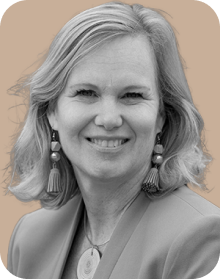
Dr Ruth Lawson-McConnell is a counsellor, supervisor, and trainer in private practice in Auckland. She did her MA (Psychology and Social Anthropology) and her PhD (Counselling Psychology) in Aberdeen, Scotland. She was born and raised in the Amazon Region of Brazil where her Scottish parents were missionaries for 36 years. She studied theology at Regent College in Vancouver BC where she lived before coming to New Zealand for the role of Senior Lecturer in Counselling at Laidlaw College. She is now in private practice, offering counselling, training, and specialist supervision on attachment issues, anxiety, depression and trauma and parent consulting on children’s emotional and behavioural issues (www.ruthmcconnell.com).
22 May | Prof. Jee Hyun Kim
A Christian Scientist’s Views on Memory and Forgetting in Mental Disorders
Learning and memory are fundamental features of humans adapting to an everchanging environment. They have been extensively studied and we have progressed significantly in our psychological and biological understanding of their role in mental disorders. In contrast, the role of forgetting is a recent topic of interest, with the increasing recognition that “to understand how we remember, we must also understand how, and why, we forget”. For example, the ability to forget helps us to adapt by focusing on the present and be creative. Importantly, forgetting allows us to manage living with ghosts from the past. The talk will describe some of the strategies of maintaining good memories while forgetting some memories that may interfere with our daily functioning, focussing on depression but also touching on addiction and anxiety. Surprisingly, biblical verses precede the latest scientific understanding of memory and forgetting, highlighting the need for strengthening our Christian identity to manage and support emotions in us and others.
Speaker Bio: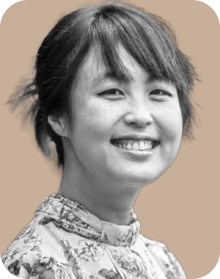
Professor Jee Hyun Kim is an Australian Research Council Future Fellow and the Head of Molecular Psychiatry Laboratory at the School of Medicine, Deakin University. Jee graduated with first class Honours and the University medal in Bachelor of Psychology from the University of New South Wales (Sydney, Australia). After obtaining her PhD, Jee received postdoctoral training at University of Michigan (Ann Arbor, USA) before her appointment at the University of Melbourne in 2011. Jee joined Deakin University in 2020. Jee studies the neurobiology of memory in mental disorders across development and ageing in rodents and humans, with a strong cognition and translation focus. Apart from basic neuroscience work in memory, Jee is currently managing the Trimetazidine In bipolar DEpression (TIDE) clinical trial, to test the efficacy of a metabolic drug on reducing depression in bipolar disorder. Jee has won numerous national and international awards for her ground-breaking work, including the World Federation of Societies of Biological Psychiatry Young Investigator Award in 2024. Jee has >100 publications, for which she is the corresponding author to >60. Citations are >4,000. Jee is an active science communicator, with her TEDxMelbourne talk reaching >800,000 views.
29 May | Dr John Roodenburg
The Myth of Wellbeing: A Perspective from Developmental Psychology
In this session we will look at what characterises validated psychological constructs and myth. We will consider their role in elucidating how we come to “know” scientifically and spiritually. We will explore some specific relevant psychological understandings of positive human development, examining implications for coming to a healthy faith in “knowing” Jesus. In this we will touch on expectations, knowing, believing, thinking (cognition), feeling (affect), attachment, identity, belonging and purpose.
Speaker Bio:
John’s primary-school teaching experience was followed by many years as a practising developmental psychologist in country Victoria, Australia. A mid-career quantitative PhD from The University of Melbourne saw him return to his passion of teaching but this time in tertiary education. John was awarded the 2020 Australian Psychological Society’s National Award of Distinction in recognition of his work at Monash University leading the Graduate E&D course and directorship of the Krongold Clinic, as well as four years as National Chair of the College of Educational and Developmental Psychology. He is a fellow of the Australian Psychological Society. With his wife and colleague, Esther, his research passion has been modelling individual differences in thinking.
| Dr Alan Gijsbers | 20 March |
What are the Sciences and Spiritualities of Clinical Practice?
| Dr Hayley Thomas | 27 March |
Delving Under the Surface: Eating Disorders and Christian Spirituality
| Dr Danny Cheah | 3 April |
Understanding Mental Health Issues in Children, Young People and Families from a Christian Perspective #dontjustprayitaway
| Dr Brett Mann | 10 April |
Mental Health, Faith, and Medical Practice
| Dr Mel Fung | 24 April |
Understanding and Responding to Gender Dysphoria: Research and Clinical Experience
| Dr Christa McKirland | 1 May |
Authority and Power Structures in the Church Which Undermine Individual Agency
| Nicolette Deva | 8 May |
The Science and Faith of Christian Contemplation
| Dr Ruth McConnell | 15 May |
Responding to the Growing Mental Health Crisis as a Christian: Clinical and Theological Perspectives
| Prof. Jee Hyun Kim | 22 May |
A Christian Scientist’s Views on Memory and Forgetting in Mental Disorders
| Dr John Roodenburg | 29 May |
The Myth of Wellbeing: A Perspective from Developmental Psychology